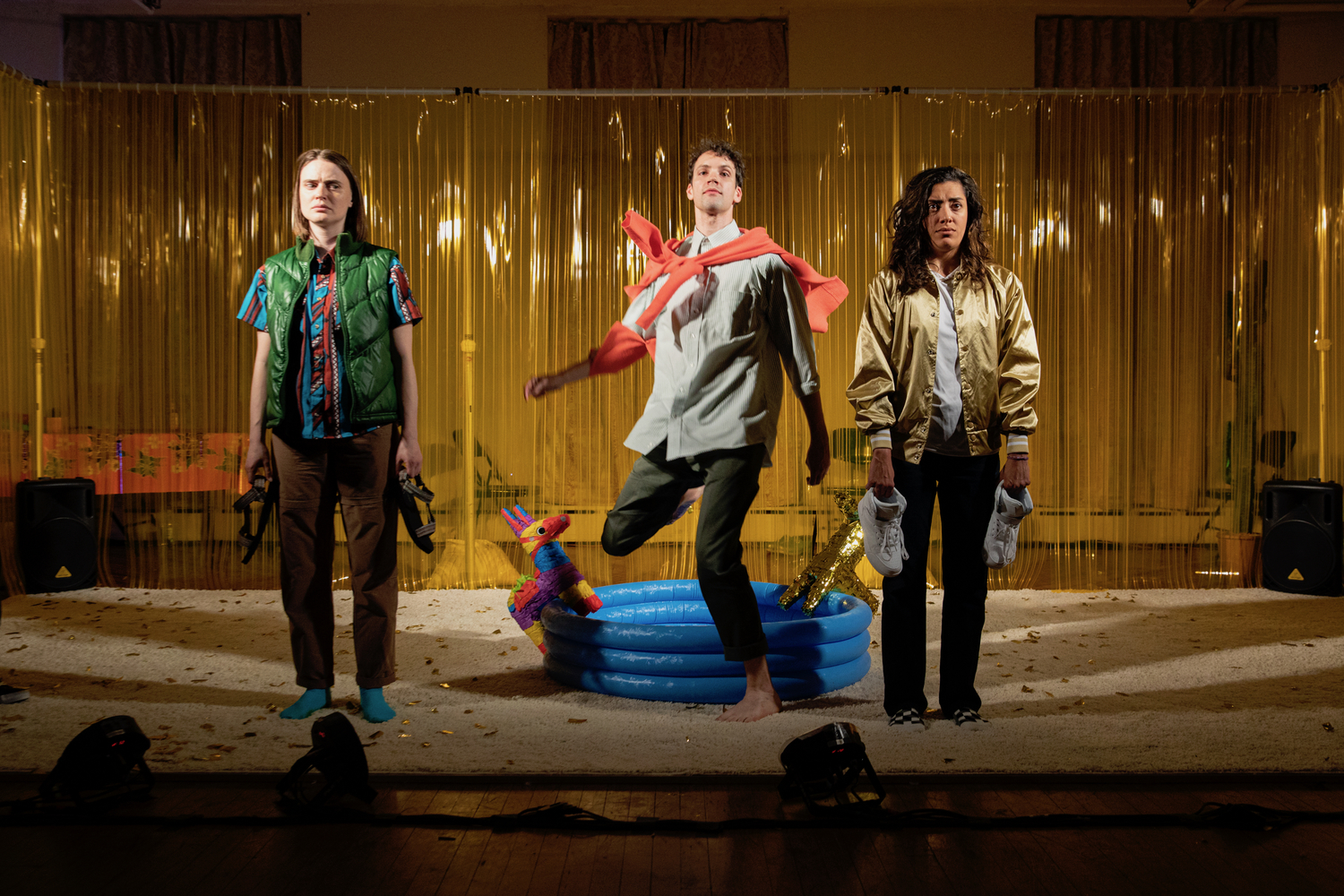Review: Queer Consciousness and Hella Life Lessons Drive BRIEF CHRONICLE, BOOKS 6-8 at Access Theater

Photo Credit: Maria Baranova
What better way to celebrate LGBTQIA+ Pride Month than with a conscience-rocking queer play that constructs identities out of the places, people, and objects we wish we could possess? Absurd, engaging and frequently flat-out surprising, Brief Chronicle, Books 6-8 is a tasty mouthful of downtown theater. Genders bend, time warps, roles reverse and sobriety teeters in this contemporary and contemplative ghost story from the expansive imagination of playwright Alex Borinsky and director Augustus Heagerty.
Brief is indeed brief; this one-act-three-scene play with a 60-minute runtime marks the debut of i am a slow tide, a Brooklyn-based performance collective committed to activating alternative pathways for consideration with a wry reflection of identity in the modern world. Brief does all that, and even takes us from Baltimore, Maryland to the beach in Mexico.
Julian (Susanna Stahlmann) is the locus of the show, visited by his well-intentioned and alcoholic mother (Joan, the sweater-and-clog attired Jacob Perkins) and a smooth-not-smarmy ghost (DT, played by Salvadoran-American theater artist Janice Amaya).
Although Joan peppers Julian with commentary about his life and their shared history, she is more self-absorbed with her quasi-quest for sobriety and the goings-on of the men who attend her A.A. meetings.
Jacob Perkins, in a role that if overacted could have easily tilted toward camp, imbues Mom/Joan with a subtle sincerity as a tender-hearted matriarch with her own set of amusing problems and perspectives. Perkins doubles as Julian's bestie, Mia.
As the ghost, DT neutralizes the telling of a horrific crime he has committed by questioning some fundamental laws: "Gravity isn't just down anymore, towards the center. It's sideways, towards the buildings. It's hard. A lot of people are having a really hard time. I'd like to get better at letting certain things go. I love in short little bursts; I'd like to get better at loving people for a long time." Although that's pretty heavy stuff for someone who describes himself as "a 20-year-old little boy," Borinsky writes with a such a natural poetic proficiency that we believe him.
Julian's mom shares a similar sense of longing: "I feel like everywhere, ever so slowly, something is changing. We're on the verge of something, all of us, on the verge of knowing how we ought to be together."
But how?
Nicole Spiezio, a bold contrast to the muted machinations of the characters around her, has one definite idea; she marches in as the singular-yet-collective Band, decked out in a bright blue uniform that looks like it was stolen from The Band's Visit travel trunk. She is armed with both a flute and flair; her exuberance and comic timing is a hilarious hitching of Friday Night Lights with Saturday Night Live. Band is earnest, confident, and addresses the audience directly: "Everyone wants to be us, we're the top of the school, we're learning hella life lessons and we're keeping it all in check. We're holding down homework we're holding down boyfriends and girlfriends we're holding down little brothers and sisters and all that on top of four hours a day of rehearsal, we're a tight knit group we're going to be friends forever, we have no secrets from each other, we are bound to one another by our labor, we're what makes the football games worth going to, we electrify crowds, we own the city's rhythm, you can feel us in your chest when we practice even when you're inside the building inside the library, we take no prisoners we're the marching band."
When this stream of egocentric consciousness seems a bit much, Mom steps in (while on vacation no less) with a bit of homespun wisdom: "Are we all really in this world? This world I hear about on TV, that everybody's talking about? Is that the one we're in, that we're all in together? Wake up, boys. We're in Mexico, and I don't want to let our lives go by in a blur of daiquiris and sun. I think we need to participate culturally. I think we need to take advantage. So I've signed us all up for this class, we'll learn a folkloric dance. It's something we can come to know about the people here. It's a way to connect." Cultural appropriation at its awkward best/worst, in one long Mom moment.
Set designer Sam Max shrouds the performance space with vibrant yellow translucent plastic panel curtains; characters slip in and out yet never fully disappear beyond the simple stage that features a party banner, an oblong table with a floral table cloth, some chairs and a cactus. A shift in geographical location is made apparent with the addition of an inflatable pool and a pair of piñatas.
A downstage-right narrator (Lindsay Head) occasionally speaks to read stage directions, until she too joins the festivities with some inspired late-in-the-play choreography.
In the place that is Alex Borinsky's world, male is female, Maryland meets Mexico, and living life necessitates facing death. Converging these phenomenon begins in one's mind, and it won't be easy. According to DT, "There are two places in my mind. Two places. I cannot fit them together. They will never eat at the same table." Borinsky's prose calls to mind a work by one of my favorite poets, Joy Harjo, who sees the table as the ultimate place of reckoning: Perhaps The World Ends Here.
You can catch Brief Chronicle, Books 6-8 through June 15 at Access Theater, 380 Broadway in Manhattan. Click HERE for tickets.
Videos
